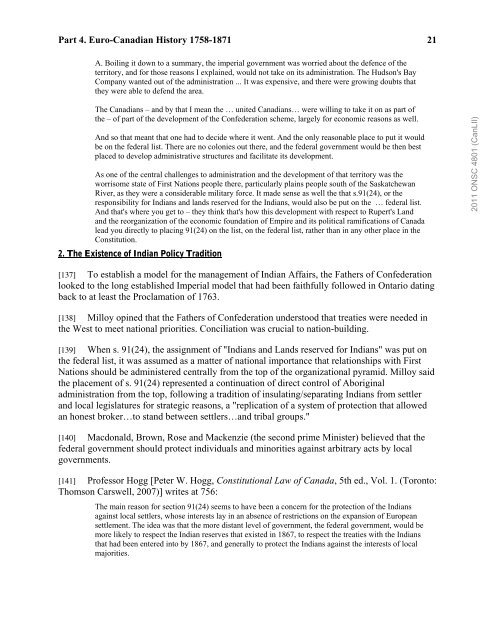Keewatin v. Minister of Natural Resources
Keewatin v. Minister of Natural Resources
Keewatin v. Minister of Natural Resources
- No tags were found...
Create successful ePaper yourself
Turn your PDF publications into a flip-book with our unique Google optimized e-Paper software.
Part 4. Euro-Canadian History 1758-1871 21A. Boiling it down to a summary, the imperial government was worried about the defence <strong>of</strong> theterritory, and for those reasons I explained, would not take on its administration. The Hudson's BayCompany wanted out <strong>of</strong> the administration ... It was expensive, and there were growing doubts thatthey were able to defend the area.The Canadians – and by that I mean the … united Canadians… were willing to take it on as part <strong>of</strong>the – <strong>of</strong> part <strong>of</strong> the development <strong>of</strong> the Confederation scheme, largely for economic reasons as well.And so that meant that one had to decide where it went. And the only reasonable place to put it wouldbe on the federal list. There are no colonies out there, and the federal government would be then bestplaced to develop administrative structures and facilitate its development.As one <strong>of</strong> the central challenges to administration and the development <strong>of</strong> that territory was theworrisome state <strong>of</strong> First Nations people there, particularly plains people south <strong>of</strong> the SaskatchewanRiver, as they were a considerable military force. It made sense as well the that s.91(24), or theresponsibility for Indians and lands reserved for the Indians, would also be put on the … federal list.And that's where you get to – they think that's how this development with respect to Rupert's Landand the reorganization <strong>of</strong> the economic foundation <strong>of</strong> Empire and its political ramifications <strong>of</strong> Canadalead you directly to placing 91(24) on the list, on the federal list, rather than in any other place in theConstitution.2. The Existence <strong>of</strong> Indian Policy Tradition2011 ONSC 4801 (CanLII)[137] To establish a model for the management <strong>of</strong> Indian Affairs, the Fathers <strong>of</strong> Confederationlooked to the long established Imperial model that had been faithfully followed in Ontario datingback to at least the Proclamation <strong>of</strong> 1763.[138] Milloy opined that the Fathers <strong>of</strong> Confederation understood that treaties were needed inthe West to meet national priorities. Conciliation was crucial to nation-building.[139] When s. 91(24), the assignment <strong>of</strong> "Indians and Lands reserved for Indians" was put onthe federal list, it was assumed as a matter <strong>of</strong> national importance that relationships with FirstNations should be administered centrally from the top <strong>of</strong> the organizational pyramid. Milloy saidthe placement <strong>of</strong> s. 91(24) represented a continuation <strong>of</strong> direct control <strong>of</strong> Aboriginaladministration from the top, following a tradition <strong>of</strong> insulating/separating Indians from settlerand local legislatures for strategic reasons, a "replication <strong>of</strong> a system <strong>of</strong> protection that allowedan honest broker…to stand between settlers…and tribal groups."[140] Macdonald, Brown, Rose and Mackenzie (the second prime <strong>Minister</strong>) believed that thefederal government should protect individuals and minorities against arbitrary acts by localgovernments.[141] Pr<strong>of</strong>essor Hogg [Peter W. Hogg, Constitutional Law <strong>of</strong> Canada, 5th ed., Vol. 1. (Toronto:Thomson Carswell, 2007)] writes at 756:The main reason for section 91(24) seems to have been a concern for the protection <strong>of</strong> the Indiansagainst local settlers, whose interests lay in an absence <strong>of</strong> restrictions on the expansion <strong>of</strong> Europeansettlement. The idea was that the more distant level <strong>of</strong> government, the federal government, would bemore likely to respect the Indian reserves that existed in 1867, to respect the treaties with the Indiansthat had been entered into by 1867, and generally to protect the Indians against the interests <strong>of</strong> localmajorities.
















